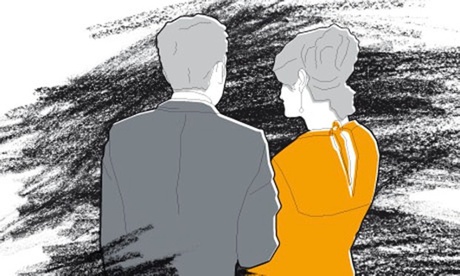
The house is spattered with blood. It has dried on to pillow-cases, shirts, towels and sofa cushions. “Looks like a murder scene,” R says, walking away from the laundry pile by the washing machine. I predict a boil wash and a litre of Vanish will do the trick but, by God, two open wounds have the power to spread a lot of pain.
“Look away,” the nurse tells me, as he injects the anaesthetic into our youngest son’s lip to numb the pain of the stitches. I am the wimp here. R is fascinated by the nurse’s sewing skills, I’m just trying to stay conscious. Our son is the least bothered; his lower lip wobbling only fractionally as his last stitch is tied up. He is, we tell him, the bravest boy in the whole world, a boy who is due a big red lollipop when we are finished here. “No vigorous face-washing or rough play for a few days, but other than that,” the nurse says, “he’ll be back to normal in no time.”
The next day, it’s my elder daughter. A surreptitious trip to a cowboy body-piercer on our recent holiday has left her with a hole three times as big as it should be and an infected ear. Because we were unaware of the piercing (long hair, expert “avert-your-eyes-away-from-the-left-side-of-my-face” skills), our daughter admits herself to A&E. I am alerted to all of this by one of the hospital staff, who calls and asks me to go straight to the hospital. My daughter is distressed and has lost a lot of blood.
The cannula in her hand feels horrid, she tells me when I arrive 10 minutes later, and I recall the weirdness of that sensation myself. It was not a vicious, searing, wicked pain at all: more a dull ache that was uncomfortable when the hand moved. I also remember the trickle of cold liquid passing into my flesh as the antibiotics were administered.
“I had to have one of those in labour with you,” I say. “It was the bit I hated most.” She looks at me and says, “I’m really sorry,” which I’m a little baffled by, but pleased about all the same. “I hope she’s learned something from this,” R texts, and I tell him to cool it because his behaviour in the past has been far from saintly; he texts back and says, “Tell her I love her.”
I spend the night on a ward with my daughter because she needs to be monitored and the next morning the doctors do their rounds, inspect her ear and ask me, “Where’s the piercing shop? They did a terrible job,” to which my daughter answers, “Spain.” Her notes are gathered, drugs prescribed and she is discharged. I wonder whether this will turn into Groundhog Day and I’ll be back in hospital tomorrow with another injury and another member of the family.
We have returned to normality then – as normal as my family ever gets. Once the blood has been Vanished out of the clothes, we can get stuck into autumn and all the crisp promise that the new season holds. The epoch-making step into recovery – when I started going to regular Al-Anon meetings and sharing how my family’s problem with addiction had affected me – was more than a year ago.
Back then, I thought the pain might dissipate if I kept on doing everything right. But nobody can do everything right all the time. And, like blood, if I’ve seen it somewhere before – on a surface or an item of clothing or a patch of floor – I can never quite look at the area or thing again without seeing where the blood once existed.
This isn’t as tragic as it sounds. It’s just a realisation that things don’t disappear. Blood flows beneath the skin even when we can’t feel or touch it. Things may sink but they’re still there. When they surface, at least we can see what we’re dealing with.
I’d rather not have to contend with too much pain, because who would choose that? However, I feel I’m better equipped to look at things that I was once terrified of and face the problems I have no control over – partly because I’m in recovery and I’m learning to live fairly contentedly now with R, who is sometimes sober and sometimes not.
It’s also because I’ve accepted that I found growing up very hard and certain members of my family a little bit nuts. And also, more significantly, because pain is an inescapable part of life for everybody.

